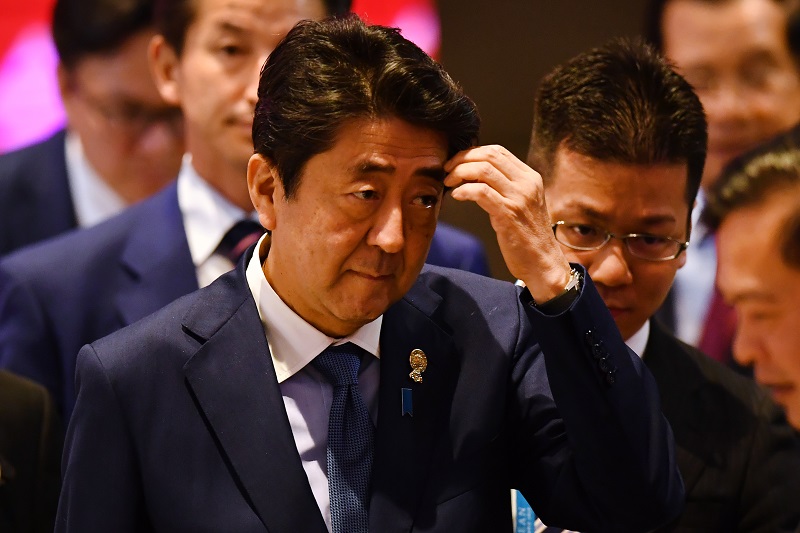
- ARAB NEWS
- 19 Apr 2024

TOKYO: Whether Prime Minister Shinzo Abe will call a snap election is expected to be the biggest issue in the Japanese political scene in 2020, pundits say.
Many politicians speculate that Abe may dissolve the House of Representatives, the all-important lower chamber of the Diet, the country's parliament, for a snap election in autumn after this year's Tokyo Olympics and Paralympics.
Abe will carefully consider whether and when to use his general election card while examining progress in Diet debates on proposed constitutional reform and the opinion of Komeito, the coalition partner of Abe's ruling Liberal Democratic Party, according to the pundits.
"I'll make a decision on a parliament dissolution without hesitation if the time comes to go to the people," Abe said Friday during the recording of a television program.
The four-year term of the Lower House lawmakers is set to end Oct. 21, 2021. Lawmakers are increasingly restless as the halfway point has already been reached.
"The Lower House may be dissolved at any moment," a former cabinet member said.
But Abe's administration is being shaken by a series of problems, such as a bribery scandal related to casino resort plans that led to the arrest of an LDP lawmaker and fresh cronyism allegations over an annual cherry blossom-viewing party hosted by the prime minister.
This has led many ruling and opposition lawmakers to believe that no Lower House dissolution is likely at least for now. A prevailing view is that the general election would follow the Olympic and Paralympic Games between late July and early September.
If the election card is retained until 2020, its value will decrease as the end of the Lower House lawmakers' term approaches.
In Komeito, many members support a general election around autumn this year, because they do not want to have a national poll around the time of a Tokyo metropolitan assembly election set for summer 2021.
By contrast, many opposition lawmakers are braced for an imminent general election, reckoning that Abe's administration wants to move fast before taking any further damage from the unfolding scandals.
Abe's term as LDP president runs until September 2021. Some LDP members have proposed allowing him to serve a fourth consecutive term by revising LDP rules, even though Abe denies such a possibility.
Meanwhile, other LDP lawmakers speculate that Abe may resign just after the Tokyo Games in order to maintain his influence by becoming a kingmaker.
If this happens, the next Lower House election may take place under a new prime minister.
Abe's potential successors in the LDP include Policy Research Council Chairman Fumio Kishida, who has indicated readiness to take over Abe's policies, and former Secretary-General Shigeru Ishiba, who seeks a policy change.
Also viewed as promising are Chief Cabinet Secretary Yoshihide Suga, Foreign Minister Toshimitsu Motegi, Defense Minister Taro Kono and welfare minister Katsunobu Kato.
In November 2019, Abe became the longest-serving Japanese prime minister including his first stint, which lasted 12 months to September 2007.
If Abe stays in power until August this year, his consecutive days in office since returning to power in 2012 will surpass the record set by his great-uncle, Eisaku Sato.
To cap off his long tenure with political legacies, Abe will ramp up efforts to advance debates on constitutional reform, pundits say.
"I definitely want to achieve it with my own hands," Abe has said.
But it is not easy to realize Diet proposals for constitutional amendment.
The LDP plans to pass a bill to revise the national referendum law during the ordinary Diet session starting soon, before commencing full debates on how to revise the country's top charter.
Things are unlikely to go ahead as the LDP hopes, because of expected resistance from major opposition parties.
If Abe dissolves the Lower House to break such a deadlock, the LDP-led ruling camp may lose its two-thirds majority, the minimum required to propose a constitutional revision.
For opposition parties, the key issue is whether they can unite to create a force powerful enough to fight Abe's administration.
The secretaries-general of the Constitutional Democratic Party of Japan and the Democratic Party for the People recently confirmed their intent to merge into a single party. But final judgment must wait until a meeting of their top leaders in the near future.
The two parties remain apart over the basic philosophies and policies, personnel appointments and other issues. The focus is whether they can merge before the ordinary Diet session begins.
Another difficult problem is how to cooperate with the Japanese Communist Party. In the DPFP, many members do not want to work with the JCP.
Even if the DPFP merges with the CDPJ, the integrated party would find it difficult to adjust candidates in Lower House constituencies with the JCP, pundits say.
Jiji Press